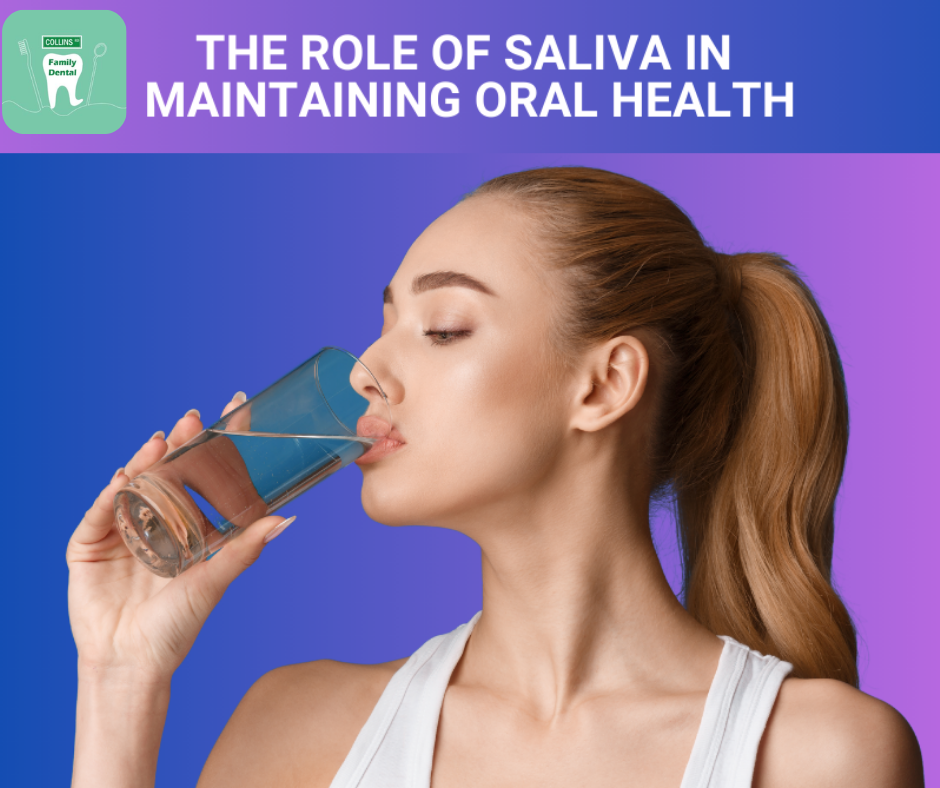Saliva is often overlooked as the watery liquid in our mouths, but it plays a vital role in maintaining oral health. Without saliva, many of the processes that keep our teeth strong, gums healthy, and mouths comfortable would not function well. At Collins Road Family Dental, we understand the importance of saliva and want to share how this natural fluid protects your smile in multiple, powerful ways.
What Is Saliva?
Saliva is a clear fluid produced primarily by several salivary glands throughout the mouth. On average, a person makes between 0.5 and 1.5 liters of saliva daily, mostly water but also a complex mixture of electrolytes, enzymes, proteins, and minerals. This specialized composition allows saliva to carry out its many protective functions that contribute to oral health.
Saliva as a Natural Cleanser and Protector
One of the primary roles of saliva is to act as a natural cleanser inside the mouth. As we eat and drink, food particles and bacteria accumulate on the teeth, gums, and tongue. Saliva helps flush away this debris, reducing the buildup of harmful bacteria and the chance of plaque formation. By washing the teeth and gums, saliva physically removes acids and sugars that bacteria produce—these acids are a leading cause of tooth enamel erosion and cavities.
Moreover, saliva contains antimicrobial agents such as enzymes and proteins that help neutralize harmful microbes, keeping the balance of oral bacteria in check. This function is crucial in protecting against tooth decay and gum disease, as an unchecked bacterial environment can lead to infections and inflammation.
Balancing pH and Neutralizing Acids
Saliva also maintains the pH balance in the mouth by neutralizing acids produced by bacteria and acidic foods or drinks. When the mouth becomes too acidic, the tooth enamel starts to break down through a process called demineralization. Saliva buffers this acidity by supplying bicarbonates and phosphates, which neutralize the acids and create an environment that encourages remineralization—repairing weakened enamel by depositing minerals like calcium and phosphate back onto the teeth.
This acid-buffering action is essential to preventing cavities and maintaining enamel strength. Without saliva’s neutralizing power, acids could rapidly erode enamel, leading to increased sensitivity, decay, and tooth damage.
Promoting Remineralization and Repair
In addition to neutralizing harmful acids, saliva contains minerals such as calcium and phosphate, which help rebuild and strengthen tooth enamel. This process, known as remineralization, helps reverse early stages of tooth decay and keeps teeth resilient.
Saliva also supports wound healing inside the mouth. It contains growth factors that promote tissue repair, which is especially important after minor injuries like a cheek bite or ulcers caused by irritation. This healing property helps maintain the integrity of oral soft tissues such as the gums and inner cheeks.
Lubrication and Comfort
Saliva lubricates the soft tissues inside the mouth, including the tongue, cheeks, and gums. This lubrication is critical for comfort, speech, and daily activities like chewing and swallowing. Without sufficient saliva, the mouth becomes dry, which can cause difficulty speaking, eating, or even swallowing. Dry mouth also makes oral tissues more prone to irritation, soreness, and infections.
Conditions like xerostomia (dry mouth) result from reduced saliva production due to aging, medication side effects, or health conditions. It is essential to address dry mouth promptly because it significantly increases risks for tooth decay, gum disease, and bad breath.
Supporting Taste and Digestion
Saliva dissolves food particles and carries them to taste receptors on the tongue, enhancing taste sensations. It also contains enzymes like amylase, which initiate the digestion of carbohydrates right in the mouth. Saliva’s digestive role means it not only protects teeth but also facilitates smooth, efficient eating.
How to Keep Saliva Flowing and Healthy
Maintaining good saliva flow is key to oral health. Here are some tips from Collins Road Family Dental to support natural saliva production and to protect your mouth:
- Stay well hydrated by drinking plenty of water throughout the day.
- Chew sugar-free gum to stimulate saliva flow.
- Avoid tobacco and excessive alcohol, which can dry out the mouth.
- Manage stress, as it can reduce saliva production.
- Address medications that cause dry mouth with your doctor.
- Maintain regular dental check-ups to monitor oral health and saliva function.
What Happens When Saliva Is Insufficient?
A lack of saliva disrupts the natural protective balance in the mouth, leading to dry mouth, difficulty tasting or swallowing, increased plaque and decay, persistent bad breath, and higher risks of gum disease. Patients with dry mouth require extra care to prevent oral infections and cavities.
If experiencing symptoms of dry mouth, it is essential to speak with dental professionals who can recommend treatments, including saliva substitutes or specialized oral care products.
Saliva is far more than just moisture; it is a powerful defender of oral health. From cleaning and protecting teeth, neutralizing harmful acids, supporting remineralization and healing, to lubricating tissues and aiding digestion, saliva plays a diverse and essential role in keeping your mouth healthy.
At Collins Road Family Dental, we encourage patients to appreciate and preserve their natural saliva flow as part of their daily oral care routine. Regular dental visits, good hydration, and healthy habits ensure saliva can continue protecting your smile for years to come.
If you have concerns about dry mouth or want to learn more about maintaining a healthy oral environment, contact Collins Road Family Dental today for expert advice and personalized care.

